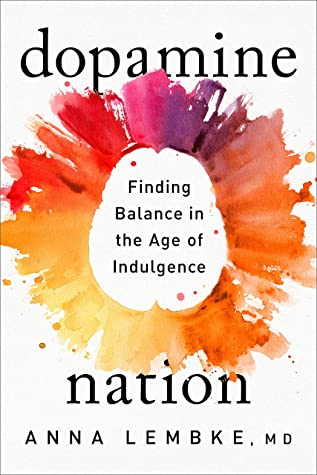- The Good: Interesting patient profiles
- The Bad: Highly anecdotal, with a few questionable conclusions
- The Literary: Drawn from modern and historical scientific studies
We fill our days with high-dopamine activities, from food, drugs, news, shopping, gaming, texting, and social media, to watching movies, television, or YouTube. The smart phone delivers digital dopamine hits at all hours, making us all prone to compulsive consumption that throws off our pleasure/pain balance. Dr. Anna Lembke shares patient stories along with new scientific discoveries to give us all a reason to find balance.
Dr. Lembke opens the book with the story of a sex addict in his mid-sixties who built himself a masturbation machine when he was a teenager. Several other patients are drug addicts and alcoholics, as you might expect. And Lembke also shares her own less severe addiction to genre romance novels. All of these people became obsessed and the behaviors became problems in their lives.
Lembke makes several smaller arguments throughout the book, including that Prohibition was a good thing for the majority of casual drinkers because increased access to alcohol can lead to addiction. She also wonders if all the trigger warnings and safe spaces have sanitized young adulthood. I’m not sure I totally agree with her on these points, but they’re minor.
The primary premise, and one I can get behind, is the idea that we no longer tolerate pain—we seek to eliminate it. In any individual’s brain, more exposure to pain actually causes pain t decrease as you become used to it. The same happens with pleasure. The more we strive to maximize happiness, the harder it is to be happy. Neuro-adaptation actually shifts the pleasure pain balance towards pain. This is evident when a fibromalgia patient becomes addicted to opioids. The drugs shift the internal baseline for pain, the body gets used to it, and the pain from the disease is often worse than before.
Essentially, there is a cost to medicating away all pain through whatever form of escape you choose. The solution is to be radically honest with yourself and others, striving for moderation, and getting some exercise.
My favorite parts of the book is the case studies throughout, around which conclusions from recent studies or historical facts are thrown in, eventually leading up to Dr. Lembke’s thesis, which is really just common sense, but still a useful reminder for everyone. Many of the conclusions are anecdotal; and many of the escapes and drugs are very helpful in some populations and situation, which is never mentioned. Recommended for anyone who struggles with addictive tendencies.
